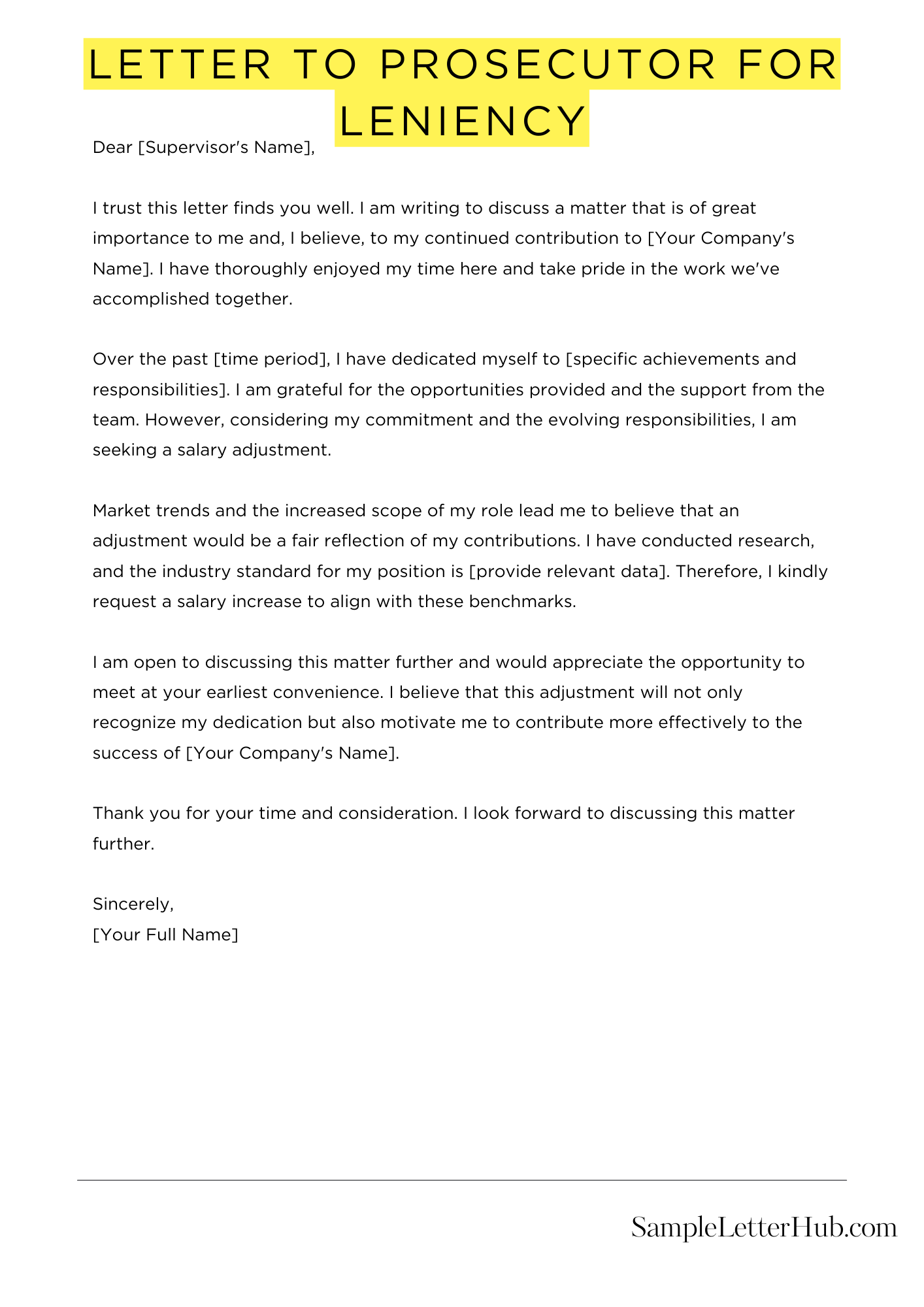A letter to the prosecutor for leniency is a formal request asking the prosecutor to be lenient in sentencing. It is typically written by the defendant or their attorney and submitted to the prosecutor before sentencing. The purpose of the letter is to persuade the prosecutor to recommend a lesser sentence or to consider alternative sentencing options.
In this blog article, we will share templates, examples, and samples of letters to the prosecutor for leniency. These letters can be used as a starting point for your own letter. We will also provide tips on how to write an effective letter to the prosecutor for leniency.
Letter to Prosecutor Requesting Leniency
Dear Prosecutor [Prosecutor’s Name],
I am writing to request leniency in the sentencing of [Defendant’s Name], who is facing charges of [Charges]. I have known [Defendant’s Name] for [Number] years, and I believe that he is a good person who has made a mistake.
[Defendant’s Name] has always been a hard worker and a responsible member of our community. He has a strong work ethic and a deep commitment to his family. He is also a loving and supportive father to his children.
I understand that [Defendant’s Name] made a mistake, but I believe that he is truly remorseful for his actions. He has taken full responsibility for his behavior and has expressed a sincere desire to make amends.
I believe that [Defendant’s Name] can be rehabilitated and become a productive member of society. He has the support of his family and friends, and he is committed to making positive changes in his life.
I respectfully request that you consider leniency in the sentencing of [Defendant’s Name]. I believe that a sentence that focuses on rehabilitation and community service would be more appropriate than a lengthy prison sentence.
Thank you for your time and consideration.
Sincerely,
[Your Name]

How to Write Letter To Prosecutor For Leniency
Writing a letter to a prosecutor for leniency is a daunting task. However, it is important to remember that the prosecutor is a human being who is capable of understanding your situation and showing compassion.
1. Start with a strong introduction
The first step is to start with a strong introduction that grabs the prosecutor’s attention. This can be done by telling a brief story about your life or by explaining the circumstances that led to your arrest.
2. Be honest and forthright
It is important to be honest and forthright in your letter. Do not try to sugarcoat your actions or make excuses for your behavior. Instead, take ownership of your mistakes and explain how you have learned from them.
3. Explain your remorse
The prosecutor needs to know that you are genuinely remorseful for your actions. Explain how your actions have affected you and others, and how you plan to make amends.
4. Highlight your positive qualities
It is also important to highlight your positive qualities in your letter. This can include your work history, your family relationships, and your community involvement.
5. Ask for leniency
Finally, you should ask the prosecutor for leniency. Be specific about what you are asking for, and explain how it will benefit you and society.
6. Be patient
It is important to be patient when waiting for a response from the prosecutor. It may take some time for them to review your letter and make a decision.
7. Follow up
If you do not hear back from the prosecutor within a reasonable amount of time, you can follow up by calling their office or sending them an email.
FAQs about Letter To Prosecutor For Leniency
What is a letter to the prosecutor for leniency?
A letter to the prosecutor for leniency is a formal request asking the prosecutor to recommend a more lenient sentence to the judge. It is typically written by the defendant or their attorney and submitted to the prosecutor’s office before sentencing.
What information should be included in a letter to the prosecutor for leniency?
A letter to the prosecutor for leniency should include the following information:
- A statement of the defendant’s remorse for the crime
- An explanation of the defendant’s circumstances that led to the crime
- A description of the defendant’s positive qualities and accomplishments
- A request for leniency from the prosecutor
When should a letter to the prosecutor for leniency be submitted?
A letter to the prosecutor for leniency should be submitted as early as possible before sentencing. The earlier the letter is submitted, the more time the prosecutor will have to consider the defendant’s request.
What are the chances of getting leniency from the prosecutor?
The chances of getting leniency from the prosecutor vary depending on the circumstances of the case. However, a well-written letter to the prosecutor for leniency can increase the chances of getting a more lenient sentence.
What are the benefits of getting leniency from the prosecutor?
Getting leniency from the prosecutor can have a number of benefits, including:
- A shorter sentence
- A less severe sentence
- The possibility of probation or community service instead of jail time
